World News

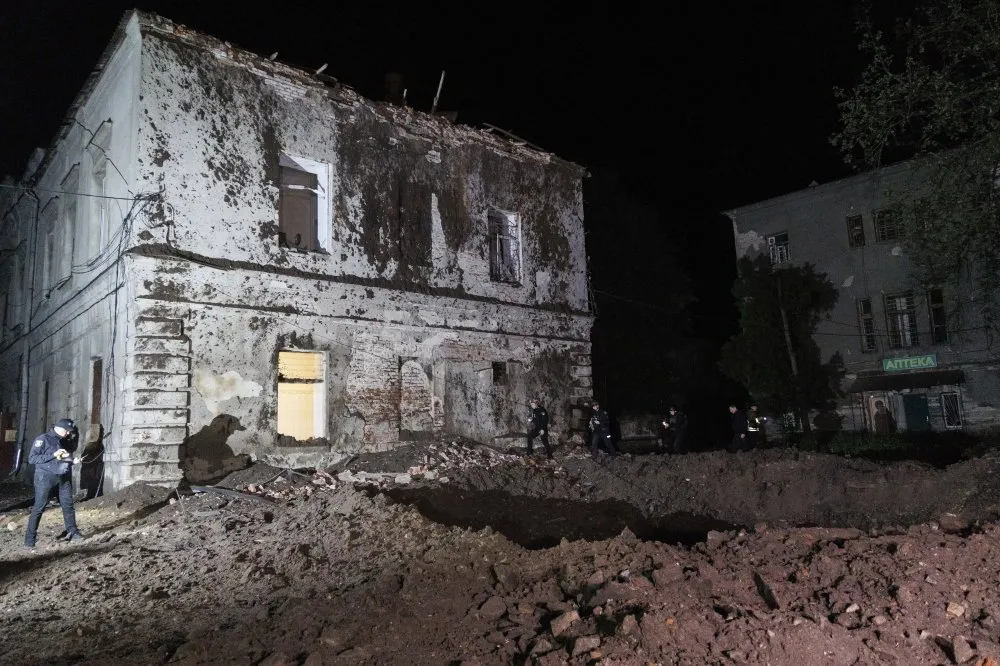
KYIV, Ukraine (AP): Russia launched a barrage of missiles against Ukraine overnight, in attacks that appeared to target the country’s energy infrastructure. Meanwhile, Russia said its air defense systems had intercepted more than 60 Ukrainian drones over the southern Krasnodar region.
Ukraine’s air force said Saturday that Russia had launched 34 missiles against Ukraine overnight, of which 21 had been shot down by Ukrainian air defenses.
In a post on Telegram, Minister of Energy Herman Halushchenko said energy facilities in Dnipropetrovsk in the south of the country and Ivano-Frankivsk and Lviv in the west had been attacked and that an engineer was injured.
Private energy operator DTEK said four of its thermal power plants were damaged and that there were “casualties,” without going into detail.
Earlier this month Russia destroyed one of Ukraine’s largest power plants and damaged others in a massive missile and drone attack as it renewed its push to target Ukraine’s energy facilities.
Ukraine has appealed to its Western allies for more air defense systems to ward off such attacks. At a meeting of the Ukraine Defense Contact Group on Friday, US Defense Secretary Lloyd Austin announced the U.S. will provide Ukraine with additional munitions and gear for its air defense launchers.
Further east, a psychiatric hospital was damaged and one person was wounded after Russia launched a missile attack overnight on Ukraine’s second-largest city, Kharkiv. Photos from the scene showed a huge crater on the grounds of the facility and patients taking shelter in corridors. Regional governor Oleh Syniehubov said a 53-year-old woman was hurt.

COLOMBO: Iranian President Ebrahim Raisi arrived in Sri Lanka on Wednesday to inaugurate a power and irrigation project, unaccompanied by his interior minister who is being sought for arrest over a deadly 1994 bombing. Raisi traveled to the island nation after concluding a state visit to Pakistan alongside Ahmad Vahidi, accused by Argentina of orchestrating the 1994 attack on a Jewish community center in Buenos Aires that killed 85 people.
Interpol issued a red notice requesting police agencies worldwide to take Vahidi into custody, and Argentina had asked both Pakistan and Sri Lanka to arrest him. But the minister was not seen accompanying Raisi, who had arrived in Sri Lanka to inaugurate an Iran-backed power and irrigation project.
Iran’s official news agency IRNA reported that Vahidi was back in Iran on Tuesday, where he attended a ceremony to induct a new provincial governor. An official from Sri Lanka’s foreign ministry told AFP that the interior minister was not listed as part of the Iranian delegation.
The 1994 assault has never been claimed or solved, but Argentina and the Zionist entity have long suspected the Iran-backed group Hezbollah carried it out at Iran’s request. Prosecutors have charged top Iranian officials with ordering the attack, though Tehran has denied any involvement. The court also implicated Hezbollah and called the attack against the AMIA — the deadliest in Argentina’s history — a “crime against humanity.”
Tuesday’s statement from the foreign ministry said: “Argentina seeks the international arrest of those responsible for the AMIA attack of 1994, which killed 85 people, and who remain in their positions with total impunity.” “One of them is Ahmad Vahidi, sought by Argentine justice as one of those responsible for the attack against AMIA,” said the statement, which was co-signed by the security ministry.
Dam project
Raisi arrived at an airport in southern Sri Lanka on Wednesday morning to inaugurate the Iran-backed $514 million Uma Oya irrigation and hydroelectricity project. It was due to be commissioned in March 2014 but sanctions against the Islamic Republic saw the project mired in a decade of delays, Sri Lanka has said.
Raisi told a public rally at the Uma Oya site that Western countries tried to convince others that they were the sole source of knowledge and technology, but “skillful Iranian experts” had developed their own capacities. “Our enemies did not favor development and progress for Iran, but the Iranian people were determined in order to realize it,” he said. Sri Lanka funded most of the $514 million project after an initial investment of $50 million from the Export Development Bank of Iran in 2010, while construction was carried out by Iranian firm Farab.
Raisi then flew to the capital Colombo and was accorded a 21-gun salute before talks with Sri Lankan President Ranil Wickremesinghe, whose office said the visit symbolized “the cooperation between the two nations in this significant infrastructure endeavor”. The Uma Oya’s two reservoirs are slated to irrigate 4,500 hectares of new land, while the hydro dam generators have a capacity of 120 megawatts.
Iran is a key buyer of Sri Lanka’s tea, the island’s main export commodity. Sri Lanka is currently repaying a legacy debt of $215 million for Iranian oil by exporting tea. The country’s only oil refinery was built by Iran in 1969. Raisi arrived in Sri Lanka after a three-day visit to Pakistan that followed tit-for-tat missile strikes in January in the region of Balochistan, which straddles the two nations’ porous border.
Tehran carried out the first strikes against an anti-Iran group inside Pakistan, with Islamabad retaliating by hitting “militant targets” inside Iran. Both nations have previously accused each other of harboring militants on their respective sides of the border. — AFP
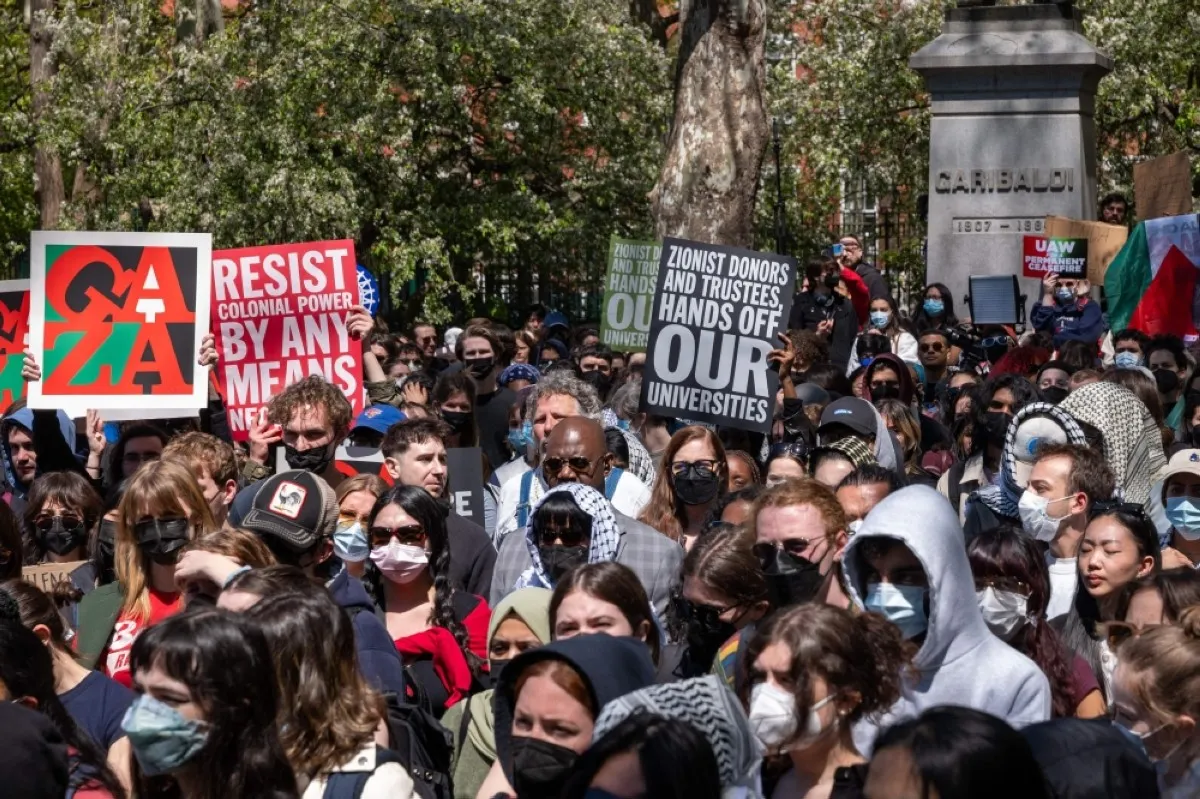
NEW YORK: Student anger with university officials and law enforcement fueled worsening tensions on several US campuses Tuesday after days of pro-Palestinian protests that have triggered mass arrests and shut down classes. Some of America’s most prestigious universities have been rocked by protests in recent weeks as students and other agitators take over quads and disrupt campus activities, furious over the Zionist-Hamas war and ensuing humanitarian crisis in Gaza.
At Columbia University in New York, the core of the spreading protests, organizers are calling for the university to divest from companies “that profit from (Zionist) apartheid, genocide and occupation in Palestine”. Pro-Zionist supporters and others worried about campus safety have pointed to anti-Semitic incidents and argue that campuses are encouraging intimidation and hate speech.
“Students have the right to protest, but they are not allowed to disrupt campus life or harass and intimidate,” Columbia’s vice president of public affairs Ben Chang told reporters Monday. “We are acting on concerns we are hearing from our Jewish students,” he said, adding that university officials were meeting “in good faith” with the demonstrators.
Protesters meanwhile — including a number of Jewish students in the “Gaza Solidarity Encampment” — say they’ve disavowed instances of anti-Semitism and are there to support Palestinians. “My college administration, my representatives in Congress and my own president have continually acted as spokespeople for the Jewish community, equating anti-Zionism with anti-Semitism,” Jewish student Sarah Borus, from Columbia’s Barnard College, said at a news conference held by Jewish and Palestinian students. “They silence us, suspend us,” she added.
Protesting students also said they had been called slurs by a pro-Zionist professor and that anti-Muslim incidents on campus were being ignored. But another Jewish student at Columbia, Nick Baum, told CNN he has felt “downright unsafe” on campus in recent days, saying anti-Semitism there has “reached a boiling point”.
Professors have pushed back since Columbia President Minouche Shafik called in police last week to arrest students, with some announcing they would not enforce student suspensions. While there is a long history of campus activism around the Zionist entity and the Palestinian cause, flaring tensions amid the war have attracted major media and political scrutiny. “Jewish students at Columbia University don’t feel safe. It’s become so dangerous that students were forced out of the classroom,” Republican Speaker of the House Mike Johnson said Tuesday. “Let’s be clear: These are not peaceful protests, these are anti-Semitic mobs.”
Further downtown, 133 people were arrested at New York University (NYU) and released after being issued with court summons, the New York Police Department told AFP, as protests also intensify at other colleges. An NYU spokesman said the decision to call police to the campus came after additional demonstrators, many of whom were not thought to be affiliated with the university, breached the barriers erected around the protest encampment.
This “dramatically changed” the situation, the spokesman said in a statement on the school’s website Monday, citing “disorderly, disruptive and antagonizing behavior” along with “intimidated chants and several anti-Semitic incidents”. On the West Coast, California State Polytechnic University announced it would be closed until at least Wednesday after pro-Palestinian demonstrators occupied an administrative building.
The protests have also drawn the attention of President Joe Biden and his administration. “Anti-Semitic hate on college campuses is unacceptable,” US Secretary of Education Miguel Cardona posted on X on Tuesday, expressing concern about the unrest. That afternoon, hundreds of NYU students and faculty staged a walkout. There have also been demonstrations at MIT, the University of Michigan, UC Berkeley and Yale, where at least 47 people were arrested Monday after refusing requests to disperse. — AFP
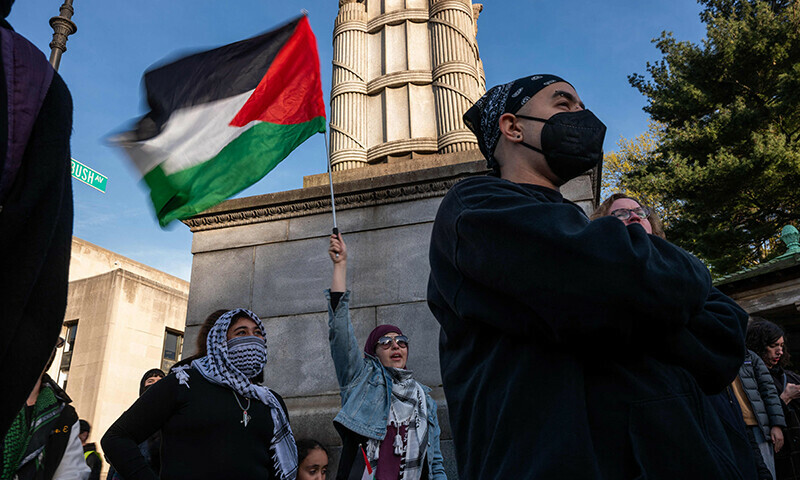
Protests against Israel filled streets in Brooklyn and escalated at universities across the United States, some of which included Jewish Passover Seders, as demonstrators demanded an end to civilian casualties in Gaza.
The growing protests follow mass arrests of demonstrators at some East Coast universities in recent days, and show a deepening dissatisfaction in the United States, historically Israel’s most important ally, with the course of the fighting with Hamas.
Pro-Palestinian protests have followed President Joe Biden, a self-declared “Zionist”, for months. At universities, protests have recently grown to encampments that draw students and faculty of various backgrounds, including of Jewish and Muslim faiths, that host teach-ins, interfaith prayers, and musical performances.
A large Brooklyn street protest reached a standoff on Tuesday when New York police began to arrest people over disorderly conduct, restraining those who refused to move with zip ties.
The Council on American-Islamic Relations criticised the use of police force to stifle dissent, saying it undermined academic freedom.
“So does defaming and endangering Jewish, Muslim and Palestinian … students based on suspiciously inflammatory remarks that a few unidentified, masked individuals have made outside of campus,” Afaf Nasher, executive director of CAIR in New York, said in a statement.
Critics of the protests, including prominent Republican members of the US Congress, have stepped up accusations of anti-Semitism and harassment by at least some protesters. Civil rights advocates, including the American Civil Liberties Union (ACLU), have raised free speech concerns over the arrests.
There have been heated exchanges of words and insults between pro-Palestinian and pro-Israeli demonstrators, particularly in the public streets around Columbia, leading congressional Republicans on Tuesday to demand that Biden do more to protect Jewish students.
Several campus protesters Reuters spoke to attributed the off-campus incidents to rogue provocateurs who are trying to hijack the protests’ message.
“There are no universities left in Gaza. So we chose to reclaim our university for the people of Palestine,” said Soph Askanase, a Jewish Columbia student who was arrested and suspended for protesting.
“Anti-Semitism, Islamophobia and racism, in particular racism against Arabs and Palestinians, are all cut from the same cloth.” Other students blamed universities for failing to protect their right to protest or stand up for human rights.
“As a Palestinian student, I too did not feel safe for the past six months, and that was as a direct result of Columbia’s one-sided statements and inaction,” said Mahmoud Khalil, a Palestinian student at Columbia.
Students at the University of California, Berkeley — a school well known for its student activism during the 1960s — set up tents in solidarity with protesters at other schools.
Columbia University students participate in an ongoing pro-Palestinian encampment on their campus following last week’s arrest of more than 100 protesters on April 23 in New York City. — AFP
Milton Zerman, 25, a second-year student at Berkeley’s law school, who is from Los Angeles, said Jewish and Israeli students have suffered from hateful harassment.
“When you’re an Israeli student on this campus, you feel like you have a target on your back, you feel unsafe and it’s no wonder students from Israel are so hesitant to come here,” Zerman said.
New York police arrested more than 120 protesters at New York University on Monday and more than 100 at Columbia University last week. Columbia cancelled in-person classes at its Upper Manhattan campus on Monday in a bid to defuse tensions.
On Tuesday, Columbia said classes for the rest of the year would be hybrid, with students able to attend online or in person.
Later, the university’s president said it was time to move forward with a plan to dismantle the pro-Palestine encampment, and gave organisers a midnight deadline to do so.
California’s Cal Poly Humboldt, a public university in Arcata, was shut down after pro-Palestinian protesters occupied a campus building.
At the University of Minnesota campus in St. Paul, police cleared an encampment after the school asked them to take action, citing violations of university policy and trespassing law.
Passover protests
Some Jewish demonstrators said they were taking the second night of the weeklong feast of Passover — a holiday feast when families gather and celebrate the biblical account of the Israelites’ freedom from Egyptian slavery — to reaffirm their faith and distance themselves from the Israeli government’s war strategy.
“I don’t see what Israel is doing as self-defence. I see incredible, absolutely unbelievable human rights violations,” said Katherine Stern, 62, of Woodstock, New York, who gave up her family Seder 190 kilometres away to attend the Brooklyn protest.
Protesters want university endowments to divest from Israeli interests and the United States to end or at least condition Israeli military aid on improving the plight of Palestinians.
Israel’s military offensive on Gaza in response to the October 7 Hamas attacks has killed over 34,000 people, displaced nearly all of Gaza’s 2.3 million people and caused a humanitarian crisis.
In Brooklyn, about 2,000 people occupied a plaza near the Brooklyn home of US Senate Majority Leader Chuck Schumer — a staunch Israel supporter and the highest-ranking Jew in the US government — chanting, “stop arming Israel”, “stop funding genocide” and “let Gaza live”.
Protesters block the street near the home of US Senate Majority Leader Chuck Schumer in the Brooklyn borough of New York, calling on Schumer to stop arming Israel, on April 23. — AFP
Organisers staged music and songs from Jewish and other cultures, giving prominence to Canadian author Naomi Klein, a peace activist who drew on her Jewish roots to argue against Zionism, which she called a “false idol”.
“We want freedom from the project that connects genocide in our name,” Klein said to cheers.
“We seek to migrate Judaism from an ethnostate that wants Jews to be perennially afraid … or that we go running to its fortress, or at least keep sending them the weapons and the donations.”
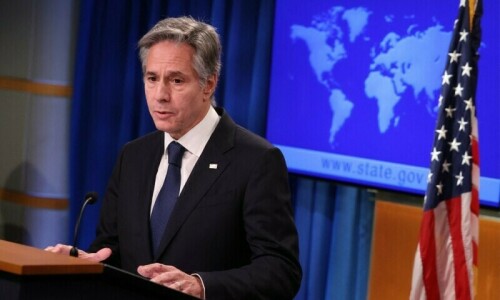
US Secretary of State Antony Blinken was due in China on Wednesday, as the United States ramps up pressure on its rival over its support for Russia while also seeking to manage tensions with Beijing.
The US diplomat will meet China’s top brass on Friday in Beijing, where he is also expected to plead for restraint as Taiwan inaugurates a new leader, and to raise US concerns on Chinese trade practices — a vital issue for President Joe Biden in an election year.
But Blinken is also seeking to stabilise ties, with tensions between the world’s two largest economies palpably easing since his last visit in June.
At the time, he was the highest-ranking US official to visit China in five years, and the trip was followed by a meeting between the countries’ presidents in November.
At that summit in California, Chinese President Xi Jinping agreed to a US wish list including restoring contact between militaries and cracking down on precursor chemicals to fentanyl, the powerful painkiller behind an addiction epidemic in the United States. Blinken will start his visit on Wednesday in Shanghai.
While in the city, he will meet students and business leaders in what an aide called a bid to highlight warm ties between the American and Chinese peoples.
The friendly side trip — the first visit by a US secretary of state to the bustling metropolis since Hillary Clinton in 2010 — would have been unthinkable until recently, with hawks on both sides previously speaking of a new Cold War between the two powers.
Treasury Secretary Janet Yellen similarly toured the manufacturing hub of Guangzhou before visiting Beijing earlier this month.
Pressing on Russia
A senior US official previewing Blinken’s trip said that the United States and China were at a “different place than we were a year ago, when the bilateral relationship was at an historic low point”.
“We also believe, and we have also clearly demonstrated, that responsibly managing competition does not mean we will pull back from measures to protect US national interests,” he said.
The Biden administration’s eagerness to engage China stands in stark contrast to its efforts to isolate Russia since its invasion of Ukraine in February 2022.
After initially being pleased that Beijing has not directly supplied weapons to Russia, the United States in recent weeks has accused China of lavishing industrial material and technology on Moscow.
Washington has encouraged European leaders, including German Chancellor Olaf Scholz, who recently visited Beijing, to stand firm on China not backing Russia, believing that it wants stable ties with the West as it focuses on addressing economic headwinds at home.
“If China purports on the one hand to want good relations with Europe and other countries, it can’t on the other hand be fuelling what is the biggest threat to European security since the end of the Cold War,” Blinken said Friday after Group of Seven talks in Capri, Italy.
Progress on fentanyl
The Biden administration has trumpeted the agreement with Xi on fentanyl as a success. A State Department official said that since the November summit, China appears to have taken its first law enforcement measures on the matter since 2017.
Blinken will ask for further implementation, the official said.
“More regular PRC law enforcement action against PRC-based chemical companies and pill press manufacturers involved in illicit fentanyl supply chains would send a strong signal of China’s commitment to address this issue,” the official said, referring to the People’s Republic of China.
One source of friction between the two countries is new legislation that cleared the US Congress on Tuesday — and which Biden intends to sign — requiring the wildly popular social media app TikTok to be divested from its Chinese parent company ByteDance, or be shut out of the American market.
Biden faces a rematch in November against former president Donald Trump, who has vowed a more confrontational approach against China.
Yun Sun, a senior fellow at the Washington-based Stimson Center, said that China’s leaders, eager to focus on their economy, were in a wait-and-see mode ahead of the US election.
“The Chinese understand that the Biden administration is unlikely to deliver any good news on trade because that simply does not support the election agenda,” she said. For Chinese leaders this year, “their priority is to keep the relationship stable”.
“Until there is clarity on who the next administration will be, I don’t think they see a better strategy,” she said.
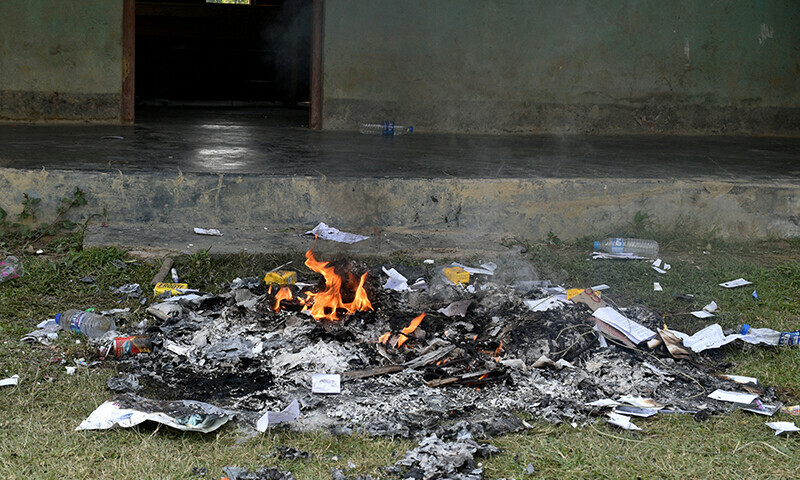
NEW DELHI: Amid reports of violence and damage to voting machines in the Manipur state torn by months of ethnic clashes, India will rerun voting at 11 polling stations in the northeastern state on Monday.
The main opposition Congress party had demanded a rerun at 47 Manipur polling stations, alleging that booths were captured and elections were rigged.
However, election authorities declared the voting void at the 11 locations and ordered fresh poll, the chief electoral officer of Manipur announced.
Prime Minister Narendra Modi is forecast to win a rare third term on the back of issues such as Hindu nationalism.
Clashes among armed groups and attempts to take over polling stations under heavy security were reported on the very first day of voting on Friday in the Manipur state.
Despite the threat of armed clashes that have killed at least 220 people in the past year, voters turned out in large numbers.
Manipur has been roiled by fighting between the majority Meitei and tribal Kuki-Zo people since May. It remains divided between a valley controlled by Meiteis and Kuki-dominated hills, separated by a stretch of no-man’s land monitored by federal paramilitary forces.

Calling for joint efforts against climate change, Prime Minister Muhammad Shehbaz Sharif on Friday hailed the United Arab Emirates (UAE) leadership for expeditiously responding to the worst rains and flooding in the Middle Eastern nation.
Over 254 millimetres of rain — about two years' worth — lashed the Emirates in days that swamped its urban centers, closing down airports, educational institutes, businesses, and highways.
Official media said it was the highest rainfall since records began in 1949, before the formation of the UAE in the year 1971.
The PM, who held a telephonic conversation with President of the United Arab Emirates (UAE) Sheikh Mohamed bin Zayed Al Nahyan, congratulated him for his government’s timely efforts to control the flooding-related damages that saved lives.
“The Prime Minister’s call was centered on his admiration for the strong resolve and impeccable efficiency with which the UAE leadership had confronted the challenges that had emerged from the recent rains in the country,” according to the statement issued by the PM Office.
PM Shehbaz commended the UAE President for demonstrating his outstanding leadership qualities and his strong commitment to ensuring the welfare of the Emirati people.
“Pakistan has also witnessed heavy rains in recent days, resulting in loss of many precious lives,” the PMO quoted the prime minister as saying.
He called for collective actions to combat the challenge of climate change and suggested that both countries strengthen their collaboration in the field.
“The UAE president expressed appreciation for the prime minister’s good wishes and reciprocated the warm sentiments for the people affected from rains and flooding in Pakistan,” state-run APP reported.
Both leaders reaffirmed their commitment to enhance bilateral cooperation in multifaceted areas.
Record rains
Deaths from heavy rains earlier this week in the UAE rose to four, authorities said on Friday, as well as flooding roads and jamming Dubai's international airport, Reuters reported.
The storm first hit Oman at the weekend, killing at least 20 people, before pounding the UAE on Tuesday with its heaviest rains in 75 years of records.
Two Philippine women and one man died in their vehicles during flooding, the government in Manila said. An Emirati man in his 70s had also died when his vehicle was swept away by floods in the northern Ras Al Khaimah emirate.
According to Reuters report, Scientists blame increasingly common extreme weather events, such as the rains in UAE and Oman, on human-led global warming.
Dubai International Airport, one of the world's busiest and a hub for travel around the Middle East, was still struggling to clear a backlog of flights three days after the storm.
As of Friday morning, 1,478 flights to and from Dubai had been cancelled since Tuesday, approximately 30% of all flights, according to aircraft flight tracking website FlightRadar24.
The main road connecting Dubai, the most populous emirate, with Abu Dhabi remained partially closed on Friday, while an alternative route saw vehicles driving through low water on the hard shoulder past abandoned cars and buses.
In the UAE's north, including in the emirate of Sharjah, local media reported people were reportedly still trapped in homes. Residents said there was extensive damage to businesses.
Rains are uncommon in the UAE, which is known for its hot desert climate and temperatures that can soar above 50 degrees Celsius in the summer.
The UAE's National Center of Meteorology said rain may return by late Monday, though predicted it would be light with a chance of heavy rain again on Tuesday in some areas.


